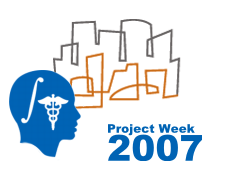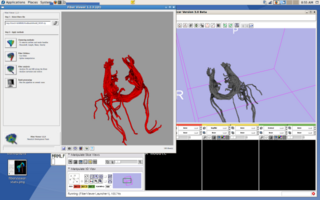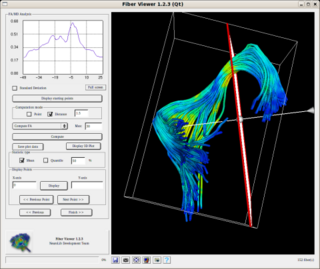Difference between revisions of "Projects/Diffusion/2007 Project Week DTI Population Analysis"
From NAMIC Wiki
| (13 intermediate revisions by 2 users not shown) | |||
| Line 1: | Line 1: | ||
| − | http://www. | + | {| |
| + | |[[Image:ProjectWeek-2007.png|thumb|left|320px|Return to [[2007_Programming/Project_Week_MIT|Project Week Main Page]] ]] | ||
| + | |[[Image:fiberviewer-stats.png|thumb|left|320px|Statistics along Uncinate in PNL atlas]] | ||
| + | |[[Image:slicer-fv.png|thumb|left|320px|FiberViewer launched from Slicer 3 [http://www.cs.unc.edu/~gcasey/video.html video]]] | ||
| + | |} | ||
| + | <br> | ||
| + | __NOTOC__ | ||
| + | ===Key Investigators=== | ||
| + | * UNC: Casey Goodlett, Guido Gerig | ||
| + | * Harvard: Marek Kubicki, Sylvain Bouix, Marc Neithammer, Raul San Jose | ||
| + | |||
| + | |||
| + | <div style="margin: 20px;"> | ||
| + | |||
| + | <div style="width: 27%; float: left; padding-right: 3%;"> | ||
| + | |||
| + | <h1>Objective</h1> | ||
| + | We are developing methods for building atlases of DTI data to provide a reference coordinate system for statistical analysis. | ||
| + | |||
| + | |||
| + | </div> | ||
| + | |||
| + | <div style="width: 27%; float: left; padding-right: 3%;"> | ||
| + | |||
| + | <h1>Approach, Plan </h1> | ||
| + | |||
| + | Our approach for building a DTI atlas is based on non-rigid registration of tensor images using a shape measure for the tensor images to drive the registration process. Our goal is to separate the shape variability from the diffusion variability through the registration process. | ||
| + | |||
| + | Plan: Our goal for the project week is to perform statistical analysis on the data provided by the PNL, which has already been registered using the procedure described in the links below. | ||
| + | </div> | ||
| + | |||
| + | <div style="width: 40%; float: left;"> | ||
| + | |||
| + | <h1>Progress</h1> | ||
| + | * ROIs defined for tractography generation in atlas | ||
| + | * fiber tract for 1 ROI created and warped to subjects | ||
| + | * Slicer 3 code to support fiber tract editing | ||
| + | * FiberViewer integration into Slicer 3 | ||
| + | * Future work: collect statistics along fiber tracts, package FiberViewer for installation into Slicer 3 | ||
| + | |||
| + | </div> | ||
| + | |||
| + | <br style="clear: both;" /> | ||
| + | |||
| + | </div> | ||
==Additional Information== | ==Additional Information== | ||
| − | + | *[[Algorithm:UNC:DTI#Population_Analysis| Description of atlas procedure]] | |
| + | * Goodlett C, Davis B, Jean R, Gilmore J, Gerig G. Improved Correspondence for DTI Population Studies via Unbiased Atlas Building. MICCAI, 2006. [[Media:Goodlett-miccai06.pdf|PDF]] | ||
Latest revision as of 13:15, 29 June 2007
Home < Projects < Diffusion < 2007 Project Week DTI Population Analysis Return to Project Week Main Page |
 FiberViewer launched from Slicer 3 video |
Key Investigators
- UNC: Casey Goodlett, Guido Gerig
- Harvard: Marek Kubicki, Sylvain Bouix, Marc Neithammer, Raul San Jose
Objective
We are developing methods for building atlases of DTI data to provide a reference coordinate system for statistical analysis.
Approach, Plan
Our approach for building a DTI atlas is based on non-rigid registration of tensor images using a shape measure for the tensor images to drive the registration process. Our goal is to separate the shape variability from the diffusion variability through the registration process.
Plan: Our goal for the project week is to perform statistical analysis on the data provided by the PNL, which has already been registered using the procedure described in the links below.
Progress
- ROIs defined for tractography generation in atlas
- fiber tract for 1 ROI created and warped to subjects
- Slicer 3 code to support fiber tract editing
- FiberViewer integration into Slicer 3
- Future work: collect statistics along fiber tracts, package FiberViewer for installation into Slicer 3
Additional Information
- Description of atlas procedure
- Goodlett C, Davis B, Jean R, Gilmore J, Gerig G. Improved Correspondence for DTI Population Studies via Unbiased Atlas Building. MICCAI, 2006. PDF
